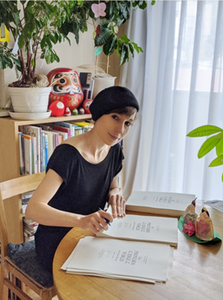 |
|
| (photo: Andrea Gherardi) | |
Laura Imai Messina is an Italian author who has lived in Japan for more than a decade. She teaches comparative literature at the Tokyo University of Foreign Studies. The Phone Booth at the Edge of the World, originally published in Italian as Quel che affidiamo al vento (What we entrust to the wind), is her third novel and the first translated into English. (This interview has also been translated.)
What was the inspiration for The Phone Booth at the Edge of the World?
I came across the real-life Wind Phone [in Otsuchi, Japan] in 2011, when I had already lived in Japan for many years. I was struck by the magic of a place that really exists, where people can pick up the handset of an unconnected device to talk to their dead [loved ones]. It is a unique place in the world, where the human voice is entrusted to the wind, so it can reach those who are now on the other side. It is a very important place because loss affects all human beings, all over the world. Sooner or later we fall behind. Anyone who has loved one day finds himself there. And yet the story continues. The Wind Phone is that place: where thought becomes word, and the word weighs less on a person's heart or their thoughts. You have to put your feelings into words in order to talk to another person, and the Wind Phone helps [visitors] make that leap.
Have you visited the real-life phone booth yourself?
For years, I have postponed my trip to the Wind Phone. As I wrote in the final note of the book, I personally have experienced profound hesitation about going there. I justified not going for years by saying I had too much work on, it was too far from Tōkyō, that the area damaged by the 2011 disaster was too hard to access. I even blamed it on my pregnancies, breastfeeding, and tiny children running around. The truth is that I was afraid of taking something, of stealing time and space from someone who needed it more than I did.
The novel includes not only the prose narrative, but bits and pieces like the contents of a child's lunchbox, and meaningful quotes. How did you decide to include these?
Language is a fruit that we must peel, gradually, to reach the essence of what we need to say. I first wrote everything I saw in a river of words, from the typhoon that attacked Whale Mountain to Takeshi's declaration of love for Yui. Then I began to "dry it out," so that the concreteness of the characters' stories would tell the story. After about four weeks, the interludes arrived. I immediately felt that they were capable of giving a particular rhythm to the narration, of lightening everything that could be heavy, or emotionally impossible to face. They are forays into reality, often devoted to joy, despite the tragedy that lies behind the protagonists' lives. Life is much more joy, in general, than we end up remembering it. Eventually I started cutting scenes, and the book became half its length. I didn't do it too reluctantly, because I knew that all the scenes not included in the novel served to help me understand who these characters were. I have infinitely loved taking care of the language of the book: it seemed to me that I was looking after a growing child.
How does the novel address grief and moving forward after loss? The characters all deal with it in different ways.
I wanted to focus on love [in the book] because love requires a good dose of trust, in the other and in oneself. On the other hand, when one has suffered a bereavement, a great sorrow, it is difficult to allow oneself the opportunity to be happy again, because the most sensitive part of oneself has been entrusted to another. And a great and satisfying love leads to precisely that happiness: desired, but also much feared.
The theme of the book is universal. We live, therefore we die. We form relationships, we fall in love. So we [also] lose, but there doesn't have to be gloom in telling it. I wanted to talk about the mourning process, but also [to share] the joy of being in the world, the feeling we have of physically entrusting parts of us to the people we love, the courage it takes to let them go here, to meet them again there. I wanted there to be lightness and a lot of love. This novel moved and excited publishers all over the world, so much so that the translation rights were acquired months before its publication. I think it was thanks to this lightness that accompanies the book. --Katie Noah Gibson

